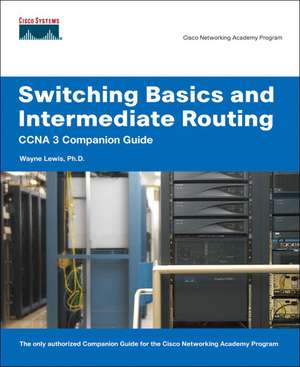Switching Basics and Intermediate Routing CCNA 3 Companion Guide (Cisco Networking Academy)
Autor Wayne Lewisen Limba Engleză Mixed media product – 20 iun 2006
- A portable reference that fully supports the topics covered in the Networking Academy CCNA 3 curriculum and aligns 1:1 with course modules
- Features enhanced readability through improved word usage, sentence structure, concise descriptions, real-world examples, and graphical presentations
- Written by well-respected CCNA instructor who brings real classroom experience to material
Preț: 305.40 lei
Nou
Puncte Express: 458
Preț estimativ în valută:
58.44€ • 63.73$ • 49.28£
58.44€ • 63.73$ • 49.28£
Cartea nu se mai tipărește
Doresc să fiu notificat când acest titlu va fi disponibil:
Se trimite...
Preluare comenzi: 021 569.72.76
Specificații
ISBN-13: 9781587131707
ISBN-10: 1587131706
Pagini: 336
Dimensiuni: 203 x 235 mm
Greutate: 0.8 kg
Ediția:1
Editura: Pearson Education
Colecția Cisco Press
Locul publicării:Indianapolis, United States
ISBN-10: 1587131706
Pagini: 336
Dimensiuni: 203 x 235 mm
Greutate: 0.8 kg
Ediția:1
Editura: Pearson Education
Colecția Cisco Press
Locul publicării:Indianapolis, United States
Cuprins
Introduction
Chapter 1 Introduction to Classless Routing
Objectives
Key Terms
VLSM
Prefix Length
Benefits of VLSM
VLSM Calculations
VLSM Example
CIDR and Route Summarization
Route Aggregation
Supernetting
CIDR Example
Classful and Classless Routing
Classful Routing
Classless Routing
RIP Version 2
RIPv2 Configuration
Verifying RIP Configuration
Troubleshooting RIP Configuration
Chapter Summary
Check Your Understanding
Challenge Questions and Activities
Chapter 2 Single-Area OSPF
Objectives
Key Terms
Link-State Routing Overview
Maintaining Routing Information Via Link States
Link-State Routing Protocol Algorithms
Benefits of Link-State Routing
Limitations of Link-State Routing
Single-Area OSPF Concepts
Comparing OSPF with Distance Vector Routing Protocols
OSPF Hierarchical Routing
Dijkstra’s Algorithm
Single-Area OSPF Configuration
Basic OSPF Configuration
Loopback Interfaces
Modifying the OSPF Cost Metric
OSPF Authentication
OSPF Network Types and OSPF Timers
Propagating a Default Route
Verifying OSPF Configurations
Troubleshooting OSPF
Chapter Summary
Check Your Understanding
Challenge Questions and Activities
Chapter 3 EIGRP and Troubleshooting Routing Protocols
Objectives
Additional Topics of Interest
Key Terms
EIGRP Concepts
Comparing EIGRP and IGRP
EIGRP Features
EIGRP Terminology
EIGRP Packet Types
EIGRP Configuration
Basic EIGRP Configuration
Configuring EIGRP Summarization
Verifying the EIGRP Configuration
Troubleshooting Routing Protocols
Troubleshooting RIP
Troubleshooting EIGRP
Troubleshooting OSPF
Additional Topics of Interest
Troubleshooting IGRP
Chapter Summary
Check Your Understanding
Challenge Questions and Activities
Chapter 4 Switching Concepts
Objectives
Additional Topics of Interest
Key Terms
Introduction to LAN Switching
LAN Segmentation
Basic Operations of a Switch
Ethernet Switch Latency
Layer 2 and Layer 3 Switching
Symmetric and Asymmetric Switching
Frame Transmission Modes
Switch Operation
Broadcast Domains
Communication Between Switches and Workstations
Additional Topics of Interest
Introduction to Ethernet/802.3 LANs
Chapter Summary
Check Your Understanding
Challenge Questions and Activities
Chapter 5 LAN Design and Switches
Objectives
Key Terms
LAN Design
LAN Design Goals
LAN Design Considerations
LAN Design Methodology
Layer 1 Design
Layer 2 Design
Layer 3 Design
LAN Switches
witched LANs and the Hierarchical Design Model
Access Layer Overview
Access Layer Switches
Distribution Layer Overview
Distribution Layer Switches
Core Layer Overview
Core Layer Switches
Chapter Summary
Check Your Understanding
Chapter 6 Catalyst Switch Configuration
Objectives
Key Terms
Starting the Switch
Physical Startup of the Catalyst Switch
Switch Port Types
Switch LED Indicators
Viewing Initial Bootup Output from the Switch
Using the System Configuration Dialog
Logging On with the Switch CLI and Using the Help Facility
Configuring the Switch
Catalyst Switch Default Configuration
Basic Catalyst Switch Configuration
Duplex and Speed Configuration
Managing the MAC Address Table
Configuring Port Security
Executing Adds, Moves, and Changes
Managing Switch Configuration Files
Password Recovery
Upgrading the Cisco IOS Image
Chapter Summary
Check Your Understanding
Challenge Questions and Activities
Chapter 7 Spanning Tree Protocol
Objectives
Key Terms
Redundant Topologies
Redundancy
Redundant Switched Topologies
Broadcast Storms
Multiple Frame Transmissions
MAC Database Instability
Spanning Tree Protocol
STP Background
Spanning-Tree Operation
Selecting the Root Bridge
Spanning-Tree Port States
Spanning-Tree Recalculation
Rapid Spanning Tree Protocol
Chapter Summary
Check Your Understanding
Challenge Questions and Activities
Chapter 8 Virtual LANs
Objectives
Key Terms
VLAN Concepts
Broadcast Domains with VLANs and Routers
VLAN Operation
VLAN Configuration
Configuring Static VLANs
Verifying VLAN Configuration
Adding, Changing, and Deleting VLANs
Troubleshooting VLANs
Troubleshooting VLAN Problems
VLAN Troubleshooting Scenarios
Chapter Summary
Check Your Understanding
Challenge Questions and Activities
Chapter 9 VLAN Trunking Protocol
Objectives
Key Terms
Trunking
VLAN Trunking Operation
IEEE 802.1Q Trunking
ISL Trunking
Configuring VLAN Trunking
VTP
VTP Concepts
VTP Operations
Configuring VTP
Inter-VLAN Routing Overview
Router-on-a-Stick
Configuring Inter-VLAN Routing
Chapter Summary
Check Your Understanding
Challenge Questions and Activities
Appendix A Answers to Check Your Understanding and Challenge Questions and Activities
Glossary
1587131706TOC052206
Textul de pe ultima copertă
The completely revised and only authorized textbook for the Cisco Networking Academy Program CCNA 3 curriculum
Wayne Lewis is the Cisco Academy Manager for the Pacific Center for Advanced Technology Training and the Legal Main Contact for the Honolulu Community College Cisco Academy Training Center. Wayne has been teaching in colleges and universities since 1986, beginning with math and transitioning to computer networking in 1998. He is the author of numerous Cisco Press titles, including CCNP 3 Multilayer Switching Companion Guide, First and Second Editions.
- A portable reference that fully supports the topics covered in the Networking Academy CCNA 3 curriculum and aligns 1:1 with course modules
- Features enhanced readability through improved word usage, sentence structure, concise descriptions, real-world examples, and graphical presentations
- Written by well-respected CCNA instructor who brings real classroom experience to material
Wayne Lewis is the Cisco Academy Manager for the Pacific Center for Advanced Technology Training and the Legal Main Contact for the Honolulu Community College Cisco Academy Training Center. Wayne has been teaching in colleges and universities since 1986, beginning with math and transitioning to computer networking in 1998. He is the author of numerous Cisco Press titles, including CCNP 3 Multilayer Switching Companion Guide, First and Second Editions.
